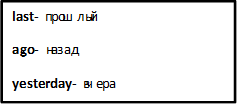
|
|
Понедельник |
|
When |
Когда |
|
Tuesday |
Вторник |
|
Why |
Почему |
|
Wednesday |
Среда |
|
What |
Что, какой |
|
Thursday |
Четверг |
|
Where |
Где, куда, откуда |
|
Friday |
Пятница |
|
Who |
Кто,кого,кому |
|
Saturday |
Суббота |
|
|
|
|
Sunday |
Воскресенье |
|
|
|
1. Послушай текст и выбери один правильный ответ.
1) When does Sally get up?
· at 6 o`clock
· at 7 o`clock
· at 8 o`clock
2) What does she often have for breakfast?
· apples and milk
· bananas and соffee
· eggs and milk
3) When does she often have 5 lessons?
· on Friday and Wednesday
· on Monday and Thursday
· on Tuesday and Wednesday
4) What can Sally do but not very well?
· read and count
· write and read
· count
5) Who does she help after school?
· her mum
· her dad
· her brother
2. Глагол be в прошедшем времени имеет две формы was и were. Was переводится как «был, была, было» (сочетается с ед.ч). Were переводится как «были» (сочетается со мн.ч).
3. Выбери правильную форму глагола:
1. Mr White and his wife (was\were) at the cinema.
2. My friends and I (was\were) at school.
3. Her grandad (was\were) in Spain.
4. He (was\were) in the park.
5. My cousin (was\were) in the café.
4. Прочитай предложения. Выбери нужную грамматическую форму:
1) Her friends (is\am\are) at home now.
2) Sally has a brother. (Her\his\my) brother likes to play computer games with Sally.
3) (Do\does) she often go to the cinema?
4) They (don`t\doesn`t) have English on Monday.
5) Now her friends (swim\swims\ are swimming) in the lake.
![]()
|
I |
My(мой) |
|
Always |
Всегда |
|
He |
His(его) |
|
Never |
Никогда |
|
She |
Her(её) |
|
Often |
Часто |
|
It |
Its(его,её) |
|
Usually |
Обычно |
|
We |
Our(наш) |
|
Every |
Каждый |
|
They |
Their(их) |
|
Sometimes |
Иногда |
|
You |
Your(твой, ваш) |
|
|
|
1. Прочитайте текс. Для каждого вопроса выбери один правильный вариант ответа из трех предложенных.
Dear granny,
We are in the Lake District now. We get up at 8, take a shower, dress and have breakfast at 9. We have breakfast at our hotel room but we don`t have lunch in the hotel. We always have lunch in town. Every day in the afternoon we go to the lake. When the lake is not cold, we swim in it. After five we often come to our room. We read, watch TV or play computer games. Sometimes we play lotto. We never go to bed at ten. Our days are very long. We go to bed at eleven or twelve o`clock.
Love,
John
1) When does John have breakfast?
a) at eight o`clock
b) at ten o`clock
c) at nine o`clock
2) Where do they go to the lake?
a) in the morning
b) in the afternoon
c) in the evening
3) When do they swim in the lake?
a) when the day is good.
b) when the lake isn`t cold.
c) when the sun is in the sky.
4) What do they sometimes play in the evening?
a) sports games
b) lotto
c) chess
5) When do they usually go to bed?
a) early
b) late
c) at 10 o`clock
2. Заполни пропуски притяжательными местоимениями (второй столбик):
1) I have a cousin Kate. … cousin likes to listen to music.
2) He has a cat. … cat is cute and funny.
3) Wendy and Jane are friends. … parents are friends too.
4) I can see a dog by the shop. … tail is very long.
5) We go to school № 4. … school is big and light.
3.
 Сделай
следующие предложения сначала отрицательными, а потом вопросительными.
Сделай
следующие предложения сначала отрицательными, а потом вопросительными.
1) Their parents were in the cinema last Monday.
2) Our friend was in London three days ago.
3) Your teachers were at school yesterday.
 |
___________________________________________________________________________________________________________________________________________________________________________________________________________________________________________________________________________________________________________________________________________________________________________________________________________________________________________________________________________________________________________________________________________________________________________________________________________________
4. Напиши 3 предложения, где ты был на прошлой неделе.
_____________________________________________________________________________________
|
|
one |
7 |
seven |
13 |
thirteen |
19 |
nineteen |
|
2 |
two |
8 |
eight |
14 |
fourteen |
20 |
twenty |
|
3 |
three |
9 |
nine |
15 |
fifteen |
|
|
|
4 |
four |
10 |
ten |
16 |
sixteen |
|
|
|
5 |
five |
11 |
eleven |
17 |
seventeen |
|
|
|
6 |
six |
12 |
twelve |
18 |
eighteen |
|
|
1. Помоги своему другу заполнить анкету для сайта «Друзья онлайн». Прочитай текст и запиши информацию в таблицу. Под каждым номером запиши только одно слово (без артиклей). Числа необходимо записать словами.
Tom is from Russia. He is 9 years old. Tom lives in Saratov. He has а sister and a brother. His sister is 8 and his brother is 11. The children have a cat. Tom likes playing football, he hates skating. He is a good pupil. Tom loves English. He doesn’t like Maths.
|
Name |
|
|
Age (возраст) |
|
|
Country (страна) |
|
|
Pet |
|
|
Sister’s age |
|
|
Brother’s age |
|
|
Favourite (любимый) sport |
|
|
Favourite lesson |
|
2. Реши примеры, запиши числа словами.
12+ 5=
17-11=
20-15=
9+10=
8+12=
26-17=
18+7=
25- 12=
16+13=
21-9=
3. Посмотри, как можно дать краткий ответ на вопросы, которые начинаются с was или were.
 Were you at school yesterday? - Yes, I was.
Were you at school yesterday? - Yes, I was.
Was he in the zoo 2 days ago?- No, he was not.
Поработайте в парах, задавая вопросы про вчерашний день.
 in the park?
in the park?
 in the zoo?
in the zoo?
![]()
 in
the cinema?
in
the cinema?





![]()
![]() at home?
at home?
on the farm?
in the swimming pool?
in the gym?
on the stage?
in the supermarket?
at café?
4. Напиши 3 предложения, где не был твой сосед по парте вчера.
Например: She wasn’t on the stage yesterday.
__________________________________________________________________________________
1. ![]() Помоги
своему другу заполнить анкету для сайта «Друзья онлайн». Прочитай текст и
запиши информацию в таблицу. Под каждым номером запиши только одно слово (без
артиклей). Числа необходимо записать словами.
Помоги
своему другу заполнить анкету для сайта «Друзья онлайн». Прочитай текст и
запиши информацию в таблицу. Под каждым номером запиши только одно слово (без
артиклей). Числа необходимо записать словами.
Olga is from Russia. She is 12 years old (лет). Olga lives in Perm, in Russia. She has two sisters and one brother. The children have a fish. Olga likes to play computer games and to swim. She is a good pupil. Her favourite lesson is Maths. She doesn’t like tea, but she likes milk.
|
Name |
|
|
Age |
|
|
Country |
|
|
Number of children in the family |
|
|
Pet |
|
|
Favourite lesson |
|
|
Favourite drink |
|
|
Favourite sport |
|
2. Раскрой скобки и поставь глаголы в нужную форму: Present Simple V/Vs (usually, often, sometimes, never, every, always) или Present Continuous is/am/are +Ving (now)
1) She … ( feed) her pets now.
2) They usually …. ( read) books in the evening.
3) Her cousin often … ( watch) TV in the bedroom.
4) We never …. ( go) to the gym in the morning.
5) Now my parents … ( ride) their bikes.
 3. Ты
уже знаешь , какие формы имеет глагол be в прошедшем времени. Назови их.
Сегодня ты узнаешь , как выглядят остальные глаголы в прошедшем времени.
3. Ты
уже знаешь , какие формы имеет глагол be в прошедшем времени. Назови их.
Сегодня ты узнаешь , как выглядят остальные глаголы в прошедшем времени.
Прочитай и переведи предложения.
1) The teacher helped the pupils.
2) Mr White liked to come home early.
3) Molly listened to radio in the afternoon.
4) Children played in the street.
4. Напиши, что из этого ты делал вчера.
· play
· cook
· jump
· watch
· Listen
· help
· wash up
· dress
· count
· skate
· dance
· ski
· kiss
· hug
1.
![]() Послушай
текст и выбери один правильный ответ.
Послушай
текст и выбери один правильный ответ.
a) How many sisters does Sandy have?
· one
· two
· three
b) What animals do they have?
· pigs, sheep and horses
· kids, sheep and horses
· fish, sheep and horses
c) How does Sandy look after (заботится) horses?
· feed them
· wash them
· cook for them
d) When does Sandy feed pigs?
· after school
· after lunch
· after breakfast
e) What colour are the sheep?
· red and black
· black and white
· red and white
2. Выбери правильный вариант предлога для каждого предложения:
1) She often takes a shower (in\on\at) the morning.
2) They usually have lunch (in\on\at) 1 o’clock.
3) I have English (in\on\at) Monday and Thursday.
4) His brother goes (on\in\to) school after breakfast.
5) Our parents like to eat eggs (with\for\on) breakfast.
6) Wendy plays computer games (with\for\on) her cousin.
3. Вспомни, как образуется простое прошедшее время. Найди все предложения с глаголами в прошедшем времени.
1) Steve helped his grandpa in the garden.
2) I’m watching TV in my bedroom.
3) They come home after school.
4) My dad and granny were in the kitchen.
5) The teacher showed us a new book.
6) You’re a good student.
7) Fred was in the shop.
8) We skated in the park.
9) Her husband listened to music.
10) He goes to the gym.
11) The bird is singing a nice song.
12) Our friends cooked pies.
4. Ты уже знаешь, что некоторые глаголы в английском языке являются исключениями, их называют неправильными глаголами, потому что прошедшее время у них образуется не путем добавления окончания ed, а другими способами. Эти глаголы надо учить наизусть.
Попробуй найти для следующих глаголов из 1 столбика их формы в прошедшем времени из 2 столбика.
feed
meet
sing
swim
run
met
ran
sang
fed
swam
Материалы на данной страницы взяты из открытых источников либо размещены пользователем в соответствии с договором-офертой сайта. Вы можете сообщить о нарушении.